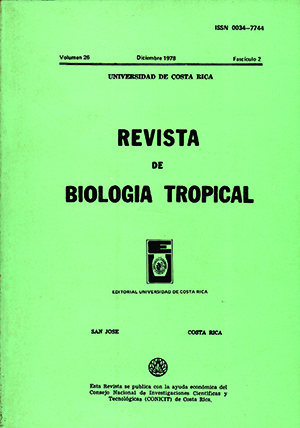Resumen
La biología de Marava arachidis, probablemente una, especie tropical, fue estudiada bajo condiciones de humedad relativa y temperatura normales de laboratorio, en el sudeste del Brasil. Fueron observados tanto el comportamiento de ovoviviparidad como los cuidados maternales.
El embrión se desarrolló completamente antes de la postura del huevo. La madre ayuda la salida del embrión del huevo al comer el corión. La fase ninfal, conteniendo cuatro estadios, duró un promedio de 49±0,33 días, con un máximo de 57 y un mínimo de 41 días. Los adultos no fecundados presentaron mayor longevidad que los fecundados. El ciclo total de vida de los individuos no fecundados alcanzó un promedio de 282±6,95 días, mientras que los fecundados 200±9,16 días. Los adultos alcanzaron la madurez sexual en promedio de 8,4±0,5 días.
Citas
Habib, M. E. M. 1976. Estudos biológicos sobre Zelus leucogrammus Perty, 1834 (Hemiptera, Reduviidae). An. Soc. Ent. Bras., 5: 120-129.
Habib, M. E. M., & P. N. Patel 1977. Biology of Heliothis virescens (Fab., 1781) (Lepidoptera, Noctuidae) 00 two hast plaots io the laboratory. lndian J. Agric. Sci., 47: 537-539.
Habib, M. E. M., & J. Vasconcellos Neto 1978. Biological studies on Botanochara impressa (Coleoptera, Chrysomelidae). In Press.
Herter, K. 1943. Zur FortpOanzungsbiologie Eines Lebendgebiireoden ohrwurmes (Prolobia arachidis Yersin). Z. Morph. Okol. Tiere, 40: 158-180.
Herter, K. 1965. Vergleichende Beobachtungen und Betrachtungen über die Fortptlanzuogsbiologie der ohrwurmcr. Z. Naturforschg., 20: 365-375.
Lamb, J. 1976. Parental behavior in the Dermaptera with special reference to Forficula auricularia (Dermaptera, Forficulidae). Can. Ent., 108: 609-619.
##plugins.facebook.comentarios##

Esta obra está bajo una licencia internacional Creative Commons Atribución 4.0.
Derechos de autor 1978 Revista de Biología Tropical






